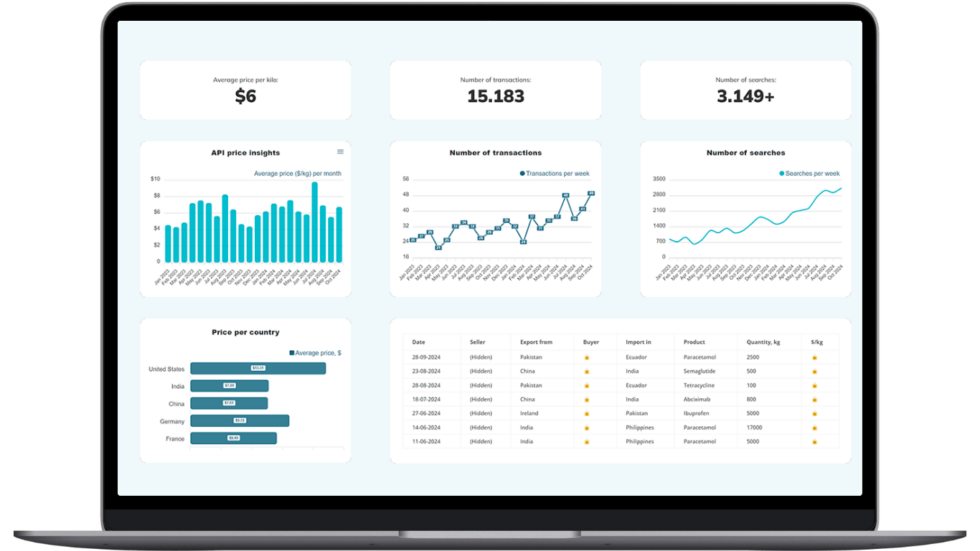API Sourcing Strategies:
Risks and Benefits of Global vs. Local

David Blok| Posted on May 08, 2023
The sourcing of APIs is a critical decision for pharmaceutical companies, as it can impact the quality, safety, and affordability of their products. One of the key considerations when sourcing APIs is whether to work with global or local suppliers. Global suppliers offer access to a wider range of APIs, economies of scale, and potential cost savings, but they also pose risks related to supply chain complexity, quality control, and regulatory compliance. Local suppliers, on the other hand, offer closer proximity, faster response times, and better knowledge of local regulations and culture, but they may also have limited capacity, less diverse portfolios, and higher costs.
To illustrate the challenges and opportunities of API sourcing, let’s take the example of a fictional pharmaceutical company called CompanyX, which specializes in the development of treatments for rare diseases. CompanyX has recently received approval from the FDA to market a new drug for a rare genetic disorder that affects only a few thousand patients worldwide. The drug relies on a highly specialized and expensive API that can only be sourced from a handful of suppliers globally.
CompanyX’s sourcing team faces a daunting task: find a reliable, cost-effective, and compliant supplier of the API that meets the company’s high standards for quality and consistency. The team starts by conducting a comprehensive market analysis of potential suppliers, both global and local, and evaluates them based on a set of criteria, such as reputation, experience, capacity, price, and regulatory compliance.
After weeks of research and negotiations, the team identifies two potential suppliers: a global manufacturer based in India and a local manufacturer based in the US. The global supplier offers a lower price, a more extensive portfolio of APIs, and a proven track record of delivering to other pharmaceutical companies. However, the team is concerned about the distance, the time zone differences, the cultural barriers, and the potential risks of quality control and regulatory compliance.
The local supplier, on the other hand, offers a higher price, a more personalized service, and a better understanding of the FDA’s requirements and expectations. However, the team is concerned about the limited capacity, the lack of diversity in the supplier’s portfolio, and the potential risks of supply chain disruptions and delays.
CompanyX’s sourcing team faces a dilemma: should they go with the global supplier and potentially save millions of dollars, or should they go with the local supplier and potentially minimize the risks of quality and compliance? The answer is not easy, and it depends on the company’s priorities, values, and risk appetite.
As we saw in the previous example, the choice between global and local API sourcing strategies is not straightforward, and it depends on a variety of factors, such as the type of API, the target market, the company’s risk tolerance, and the regulatory environment. In this article, we will explore the risks and benefits of global versus local API sourcing strategies in the pharmaceutical industry. Whether you are a startup or a multinational corporation, the insights and best practices provided in this article can help you navigate the complex landscape of API sourcing and optimize your supply chain for maximum efficiency and value.
1. Regulatory Environment
The regulatory environment for APIs can vary significantly depending on the country and region. When sourcing APIs for the pharmaceutical industry, it is essential to consider the regulatory requirements for each region and determine whether it is more beneficial to work with global or local suppliers. Local suppliers may have more knowledge and understanding of the regulatory environment in their region, making it easier for them to comply with local regulations.
Interested in learning more about different pharma regulations around the world? Then, read our blog!
2. Quality Control
Quality control is critical in API pharma sourcing strategies. The quality of APIs is essential to the safety and efficacy of the final product, and it is important to select a supplier that has robust quality control processes in place to ensure that the APIs are consistent and meet the required specifications. While global suppliers may have more experience and expertise in quality control, local suppliers may be more accessible, which may allow for more direct oversight of quality control processes.

Make Smarter API Decisions with Data
Access exclusive insights on global API pricing, export/import transactions, competitor activities and market intelligence.
3. Cost
Cost is a critical factor in API pharma sourcing strategies. It is important to balance the cost of the APIs with the need for quality and consistency. While global suppliers may offer cost savings through economies of scale, businesses must also consider additional costs, such as shipping and transportation. Local suppliers may have higher prices, but businesses may be able to save on additional costs, such as shipping and transportation.
4. Capacity and Scalability
Capacity and scalability are essential considerations when sourcing APIs for the pharmaceutical industry. The API supplier must have the capacity to meet the demand for the API and be able to scale up production if necessary. It is also important to consider the supplier’s ability to meet future demands and to have contingency plans in place to address potential supply chain disruptions.
5. Supply Chain Risk
Supply chain risk is an essential factor in API pharma sourcing strategies. Risks can include disruptions in supply, quality control issues, and geopolitical risks. It is essential to assess the risk associated with each supplier and to establish contingency plans to mitigate those risks. Global suppliers may be more prone to disruptions in the supply chain due to political instability or natural disasters, while local suppliers may be more susceptible to supply chain disruptions due to limited capacity.
6. Cultural and Linguistic Barriers
Cultural and linguistic barriers are also essential factors to consider when determining whether to work with global or local suppliers. Pharmaceutical companies must assess their ability to communicate effectively with suppliers, both in terms of language and cultural differences. Global suppliers may be more diverse and may require businesses to adapt to different languages and cultural norms. In contrast, local suppliers may be more familiar with the business’s culture and language.
Want to learn how to eliminate these cultural barriers? Then, check out our blog!
Conclusion
In conclusion, the decision to work with global or local suppliers for API pharma sourcing requires careful consideration of several factors. Pharmaceutical companies must assess the regulatory environment, quality control processes, cost, capacity and scalability, supply chain risk, and cultural and linguistic barriers to determine the best sourcing strategy. By selecting the right APIs from the right suppliers, pharmaceutical companies can ensure that their products are safe, effective, and cost-efficient.
If you have any API sourcing challenges, search here and use our platform (for free).





